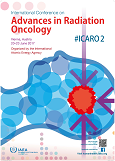Speaker
Ahmad Nobah
(King Faisal Specialist Hospital & Research Centre)
Description
Purpose: The quality of any plan for a radiotherapy patient is as good as the planner. Achieving optimum plans require both knowledge in the capabilities of the treatment planning system (TPS) and the clinical expertise of the planner. The aim of this competition is to challenge planners worldwide to do their best plan and then compare their dose objectives with others using the same or another TPS. Global transfer of knowledge is then shared through webinar sessions in which top planners from each TPS category share their planning tips and techniques. The major outcome of this initiative is to distribute global knowledge and best practices among the radiotherapy planners, which will lead to better plan qualities for cancer patients. in the whole world, knowledge sharing is worldwide and so is the impact.
Methods and Materials: A left sided breast case with axilla and supraclavicular lymph nodes was put for the challenge. The dose scheme is 50 Gy to PTV_TOT_EVAL delivered in 25 fractions. Around 400 participants from 50 countries have registered from different geographic regions (36% from Asia, 4% from Africa, 38% from Europe, 5% from South America, and 10% from North America).
The quality metrics, generated by the Plan IQ software (Sun Nuclear Corp.) were extracted from the RTOG protocol 1304 with even tighter tumor conformity and homogeneity indicators and tighter organ at risk (OAR) sparing criteria. All participants received the same dataset package: The CT DICOM image set, DICOM structure set, set of dose quality metrics, and the general planning rules that define certain practical aspects of the plan, i.e. allowed max number of fields, field arrangements and angles, energy, dose calculation algorithm, use of advanced heterogeneity correction, and size of dose calculation grid. The participants were given two weeks to submit their plans, which were evaluated by the PlanIQ software and were given scores out of 100 points.
Results: Around 220 plans generated by different commercial TPS’s, Varian-Eclipse, Elekta-Monaco, Philips-Pinnacle, Accuray-Tomotherapy, RaySearch-RayStation, and others. Of which, only 180 plans were evaluated using the Plan IQ software. The plans submitted per TPS were as follows: 93 Eclipse plans (51.6%) 30 Monaco plans (16.7%), 19 Pinnacle plans (10.5%), 13 Tomotherapy plans (7.2%), 10 RayStation plans (5.6%), and 15 plans from other vendors (8.3%). The scores’ statistics per TPS were as follows: Eclipse’s mean score was 58.3% (STD= 13.5% with mean deviation of 11.1%); Monaco’s mean score was 62.1% (STD= 13.8% with mean deviation of 10.9%); Pinnacle’s mean score 73.1% (STD= 17.4% with mean deviation of 13.9%). RayStation’s mean score was 89.6% (STD= 11.3% with mean deviation of 8.4%); and for Tomotherapy the mean score was 66.5% (STD= 20.1% with mean deviation of 16.7%). The highest score was 98.2/100.
Following the announcement of the results, a series of webinars was arranged with the 3 top planners from each TPS category. The webinars are free of charge and were attended by planners using the same TPS as well others who wanted to learn planning tricks. Each webinar lasted for 1 hour, 20 minute per presenter, followed by questions and answers session. The feedback from the participants was overwhelmingly positive in regards to the knowledge shared that a WhatsApp group was initiated in which participants and others who came later keep on sharing their questions and solutions when it comes to clinical treatment planning. A youtube channel was also initiated to allow others to watch the webinars and other materials.
Conclusions: In the 21st century knowledge transfer and learning is not confined to physical sites. We have initiated a plan competition that metamorphed into a truly global knowledge sharing and training tools. We noticed that the competition raised the awareness of TPS capabilities and participants who scored low have resubmitted plans that got high scores. Social media was used to create a community of planners to keep the momentum of learning and knowledge transfer going strong. In 2017, another case will be presented in the 2nd edition of the plan competition and this will kick start another round of educational webinars. Our aim is to hold these competitions and the subsequent educational webinars annually, each competition will feature new difficult cases or testing new features of TPSs such as the auto-planning capability. The ultimate goal is better patients’ plans through increasing both clinical and TPS knowledge.
| Institution | King Faisal Specialist Hospital & Research Centre |
|---|---|
| Country | Saudi Arabia |
Author
Ahmad Nobah
(King Faisal Specialist Hospital & Research Centre)
Co-authors
Belal Moftah
(King Faisal Specialist Hospital & Research Centre)
Christine Higby
(University of Oklahoma)
Shada Wadi-Ramahi
(King Faisal Specialist Hospital & Research Centre)
Waleed AlNajjar
(King Faisal Specialist Hospital & Research Centre)

